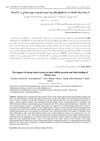 343 citations,
December 2008 in “Endocrine Reviews”
343 citations,
December 2008 in “Endocrine Reviews” Metformin helps with menstrual cycles and insulin levels in PCOS but is less effective for hair growth, diabetes prevention, and weight loss, and may improve fertility and reduce diabetes risk.
 1 citations,
June 2016 in “Yāftah/hā-yi nuvīn dar ̒ulūm-i zīstī”
1 citations,
June 2016 in “Yāftah/hā-yi nuvīn dar ̒ulūm-i zīstī” Sheep testis extract significantly improves wound healing and hair growth in rats.
8 citations,
October 2020 in “Stem cell research & therapy” DNMT1 helps turn hair follicle stem cells into fat cells by blocking a specific microRNA.
31 citations,
November 2020 in “International journal of molecular sciences” Adipokines affect skin health and could be targeted for treating skin diseases.
8 citations,
November 2019 in “Clinical Science” High DHA levels delay wound healing and worsen skin repair quality.
Natural products may help treat hair loss by promoting hair growth with fewer side effects.
1 citations,
June 2021 in “Singapore Medical Journal” Dutasteride and finasteride can help increase hair growth gene expression but need further improvement.
 53 citations,
April 2018 in “Journal of The American Academy of Dermatology”
53 citations,
April 2018 in “Journal of The American Academy of Dermatology” Cancer treatments often cause hair disorders, significantly affecting patients' quality of life, and better management methods are needed.
1 citations,
January 2021 in “Indian Dermatology Online Journal” PRP can help treat hair loss but needs standardized methods for best results.
 1 citations,
January 2017 in “Elsevier eBooks”
1 citations,
January 2017 in “Elsevier eBooks” The document concludes that new treatments for hair loss may involve a combination of cosmetics, clinical methods, and genetic approaches.
 12 citations,
January 2010 in “European Journal of Dermatology”
12 citations,
January 2010 in “European Journal of Dermatology” Norgalanthamine from Crinum asiaticum may help hair grow.
 25 citations,
July 2017 in “Archives of Dermatological Research”
25 citations,
July 2017 in “Archives of Dermatological Research” Herbal products might promote hair growth with fewer side effects, but more research is needed to confirm their safety and effectiveness.
March 2024 in “Cosmetics” New regenerative techniques show promise for improving skin, healing wounds, and growing hair.
 March 2024 in “Indian Journal of Dermatology/Indian journal of dermatology”
March 2024 in “Indian Journal of Dermatology/Indian journal of dermatology” Exosomes could be key in treating skin conditions and healing wounds.
 5 citations,
April 2018 in “Journal of Dermatological Science”
5 citations,
April 2018 in “Journal of Dermatological Science” Adjusting estradiol-ANGPT2 levels can promote hair growth in female pattern hair loss.
 4 citations,
August 2017 in “Cosmetics”
4 citations,
August 2017 in “Cosmetics” The extract reduced sebum production and promoted hair growth.
February 2023 in “Frontiers in Pharmacology” Water extract of Cacumen Platycladi helps hair growth by activating specific cell pathways.
 December 2024 in “Frontiers in Pharmacology”
December 2024 in “Frontiers in Pharmacology” Araliadiol may promote hair growth like minoxidil without being toxic.
4 citations,
June 2021 in “Frontiers in Pharmacology” Bone marrow stem cells and their medium help hair regrowth.
 March 2015 in “Polish Journal of Public Health”
March 2015 in “Polish Journal of Public Health” Blood vessel patterns in skin diseases relate to certain blood markers in systemic sclerosis but not in psoriasis or psoriatic arthritis, and may indicate circulation issues in alopecia.
4 citations,
March 2022 in “Pharmaceutics” Regenerative cellular therapies show promise for treating non-scarring hair loss but need more research.
 1 citations,
September 2013 in “Elsevier eBooks”
1 citations,
September 2013 in “Elsevier eBooks” Hair ages and thins due to factors like inflammation and stress, and treatments like antioxidants and hormones might improve hair health.
 March 2021 in “PARIPEX INDIAN JOURNAL OF RESEARCH”
March 2021 in “PARIPEX INDIAN JOURNAL OF RESEARCH” Microneedling combined with platelet-rich plasma therapy is more effective for hair regrowth in androgenic alopecia than microneedling alone, but it's more painful.
 11 citations,
October 2016 in “Biomedicine & Pharmacotherapy”
11 citations,
October 2016 in “Biomedicine & Pharmacotherapy” Both human platelet lysate and minoxidil can promote hair growth, but they affect different genes and cell survival rates.
 1 citations,
January 2009 in “Drug delivery system”
1 citations,
January 2009 in “Drug delivery system” Anti-aging treatments like hair transplants, minoxidil, and finasteride effectively promote hair growth.
 149 citations,
April 2004 in “Journal of Dermatological Science”
149 citations,
April 2004 in “Journal of Dermatological Science” Minoxidil boosts hair growth by increasing cell production and survival.
15 citations,
September 2014 in “PloS one” The study found that analyzing certain cell signaling pathways is not a reliable method to tell apart two types of skin tumors.
 22 citations,
November 2008 in “International Journal of Dermatology”
22 citations,
November 2008 in “International Journal of Dermatology” A mix of 5-aminolevulinic acid and iron ion can speed up hair growth.
263 citations,
February 2020 in “International journal of molecular sciences” ADSCs help in wound healing and skin regeneration but need more research for full understanding.
2 citations,
April 2022 in “Biomedicines” Low-frequency electromagnetic fields may help hair growth by affecting certain growth-related molecules.
















